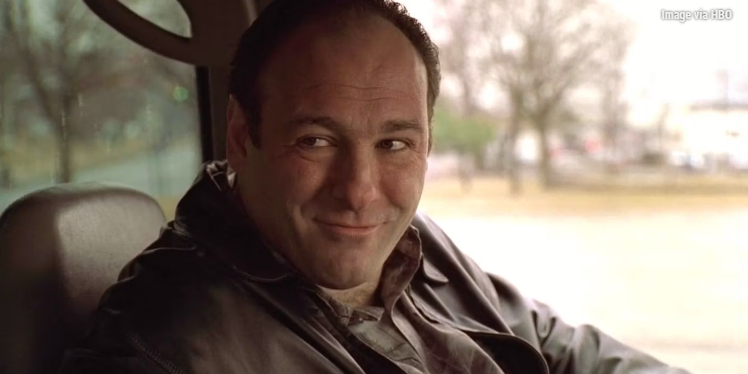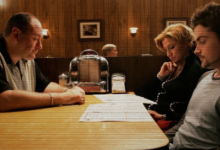This ‘Sopranos’ Death Is Still TV’s Lamest
I mean…really?
Of all the lame characters in television, The Sopranos’ Jackie Aprile Jr. (Jason Cerbone) was perhaps the most pathetic of them all, and his inevitable death was symbolic of his insipid existence. As the son of the former DiMeo family boss, Jackie Aprile, one would have easily surmised that Jackie Jr. would be cut from the same cloth. However, as the plot lines of arguably the greatest television show in history would present, he was like that little pebble in your shoe: it never posed a real threat, and was more of an annoyance than anything else. Jackie Jr.’s demise was as paltry as it gets on TV, but as the series illustrates…that was exactly the point. The kid almost drowned in three inches of water after all, and it was a sign of what was to come for him.
Jackie Aprile Jr. Has Always Been Pathetic

First appearing in the episode “The Knight in White Satin Armor” of Season 2, essentially everyone in the Soprano family had nothing but good things to say about him. He was kept away from the business by his father, who wanted him to be his own man outside the criminal underworld. When his father dies, he willingly rides the coattails of his uncle Richie (David Proval), and ingrains himself into what they call “this thing of ours.” When Richie gets killed by Janice Soprano (Aida Turturro), Jackie tries to go back straight. He starts to become a constant figure in the series, at the same time as his mother’s boyfriend Ralph Cifaretto (Joe Pantoliano), and although he carries disdain for him initially, is magnetized by the appeal of the mob life. Ralph was a soldier for the Soprano family after all, and Jackie’s feeble mind was slowly consumed by the thought of decadence.
As much of a bad influence as Ralph was in his young life, one could easily chalk it up to his innate sense of forgoing responsibility. Rather than take the path his father wished for him, he chose a much more seductive way to be successful. Who could blame the guy? He was, after all, the son of the former boss, and he constantly reminds everybody of this fact. Jackie Jr., at least in his own mind, felt that there should have been something given to him, even granted positions because of his family name. Ultimately, this is what would spell disaster for the maverick.
When he decides to get in on the action, he immediately gets into trouble for his inexperience. When he and Christopher Moltisanti (Michael Imperioli) rob a benefit concert, he freezes in the car and is racked by his nerves. Thinking he has some pull with the family, he decides to help out Matush, who got kicked out from Adriana La Cerva’s (Drea De Matteo) club for selling ecstasy. He promises him, with an extremely cringey The Godfather-esque pose, that he will do what he can to get him to sell drugs at the club. Obviously, Matush gets beaten up again, despite the “help” Jackie Jr. offered. Jackie seems to think that scenes in the movies, and the deals that happen in front of his eyes, immediately translate into reality for him and his crew. His relationship with Tony Soprano’s (James Gandolfini) daughter Meadow (Jamie Lynn Sigler), which was initially a good break for him, only worsened his situation.
It’s Not Great When You Disappoint Tony Soprano

Tony, who was a close friend and associate of Aprile Sr., promised Jackie’s father that he would look after the kid, and keep him away from the mobster life. However, Jackie Jr.’s rebellious nature got in the way, strengthened by a bond he had with Tony Soprano. He was dating the boss’s daughter, and being a close family friend, he was practically invincible. Of course, in typical Jackie Jr. fashion, he messes it all up. Tony sees him gambling at casinos and getting lap dances in strip clubs, all of which contribute to his disappointment. As he is confronted by Tony in the bathroom, he drops a gun, which infuriates the mob boss. He wants nothing more to do with the kid, and Aprile Jr. slowly spirals downward.
His relationship with Meadow ends after she discovers him cheating. In a bid to regain some of his glory, and after hearing a bravado-filled story about Tony from Ralph, he goes to rob a card game. They accidentally kill the resident mob dealer, and injure Furio (Federico Castelluccio). As is his entire life, he was unlucky on that day as Christopher recognized his face behind the mask and was ratted out by one of his friends. He bottoms out, only experiencing the cheap thrills without reaping the enticing benefits of crime. It seems like every step he takes down the path his father didn’t want for him is leading him straight to hell. If only he listened, but it’s Jackie Jr. we’re talking about here. Aside from repeatedly blurting out how he does things in the name of his father, he is inconsistent in his approach and haphazard in his thinking.
This Boring Death on ‘The Sopranos’ Might Have a Purpose

As a result of his actions, he begins to hide out in the Boonton projects. Basically a dead man walking, he begs Tony for his life, which is a plea that gets swiftly ignored. In his last moments, he plays chess with one of the kids and even here he couldn’t catch a break. Overwhelmed by his opponent, he flings the chess set, effectively surrendering. This is basically a representation of his life. When things get tough, he quits, never learns from his mistakes, and counts on whimsical favors. When Jackie Jr. walks out to get some air, he gets shot in the head by Vito Spatafore (Joseph R. Gannascoli) in the most unintentionally hilarious way. Or was it intentional?
Upon reviewing the short sequence of his death, it’s completely different from the rest of the shocking murders in all of The Sopranos. It feels rushed, without gravitas, and lacks a sense of significance. He is even shot by the worst prop gun imaginable, wherein the barrel doesn’t move upon shooting, and a shell isn’t ejected after it’s shot. It cuts immediately to him falling down what is an obviously painted patch of snow, and ends with the lumbering Vito walking slowly to his escape vehicle. Even the viewer who is used to the suspension of disbelief provided by fiction will question this thing. How can a big, slow, waddling man sneak up on a relatively young guy who could have seen him coming from a mile away? How could no one have seen a nonchalant man taking his sweet time entering a vehicle after he has literally shot someone to death? Yes, this entire sequence is a mess, but perhaps that is exactly the point. Knowing David Chase and his thoughtful work, this pathetic death might actually be symbolic.
Over the course of The Sopranos, up until this very point, spectators have borne witness to the comedy that is Jackie Jr.’s life. He miscalculated every opportunity that was given to him on a silver platter, made the most boneheaded decisions in life, and even decided to cheat on a mob boss’s daughter. To treat his death in the most glorified way possible, or to even give it some sense of pomp would have completely nullified what his character stood for. It might be the most embarrassing representation of a character’s end on television, but it served a purpose. The great philosopher Aristotle mentions in Poetics that the best endings are surprising, yet inevitable, and Jackie Aprile Jr.’s farcical death is the only way it could have gone. Well, at least he didn’t suffer.

